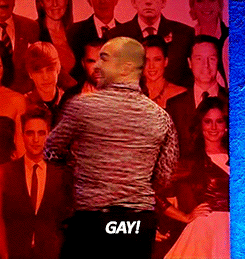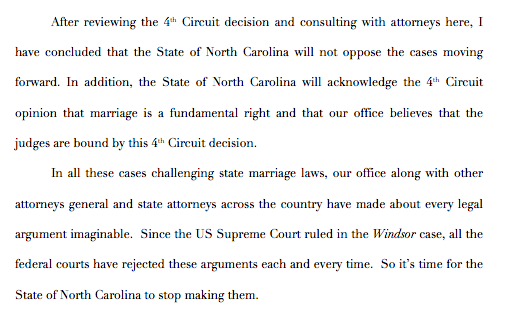http://www.roanoke.com/news/virgini...cle_61d92242-f9e6-502c-8ba4-43a1ec9009ff.html
Full ruling: http://www.ca4.uscourts.gov/Opinions/Published/141167.P.pdf
Genderless dystopia marches on. 4th Circuit is made up of Virginia, West Virginia, North Carolina, and South Carolina (Maryland as well, but same-sex marriage is already legal there). About damn time. I've been going to their daily opinion page for the last three weeks waiting for this to pop, lol. The decision is temporarily stayed, for 21 days.
A federal appeals court declared today that Virginia’s prohibition on same-sex marriage violates the U.S. Constitution.
It’s the third such ruling at the federal appellate level following a string of similar decisions by district and state judges around the country and helps set the stage for a potential landmark ruling by the U.S. Supreme Court settling the gay-marriage issue for the entire nation.
The 2-1 ruling by a three-judge panel of the U.S. 4th Circuit Court of Appeals upholds a February decision by U.S. District Judge Arenda Wright Allen that the 400-year-old ban denies gay and lesbian Virginians their constitutional rights to due process and equal protection under the law.
The appeals court panel was composed of Judges Henry Floyd, Roger Gregory and Paul Niemeyer. Floyd was appointed by President Barack Obama, Gregory by President Bill Clinton, and Niemeyer by President George H.W. Bush.
Full ruling: http://www.ca4.uscourts.gov/Opinions/Published/141167.P.pdf
Genderless dystopia marches on. 4th Circuit is made up of Virginia, West Virginia, North Carolina, and South Carolina (Maryland as well, but same-sex marriage is already legal there). About damn time. I've been going to their daily opinion page for the last three weeks waiting for this to pop, lol. The decision is temporarily stayed, for 21 days.
"Civil marriage is one of the cornerstones of our way of life. It allows individuals to celebrate and publicly declare their intentions to form lifelong partnerships, which provide unparalleled intimacy, companionship, emotional support, and security. The choice of whether and whom to marry is an intensely personal decision that alters the course of an individual’s life. Denying same-sex couples this choice prohibits them from participating fully in our society, which is precisely the type of segregation that the Fourteenth Amendment cannot countenance."
"Neither Virginia’s federalism-based interest in defining marriage nor our respect for the democratic process that codified that definition can excuse the Virginia Marriage Laws’ infringement of the right to marry"






